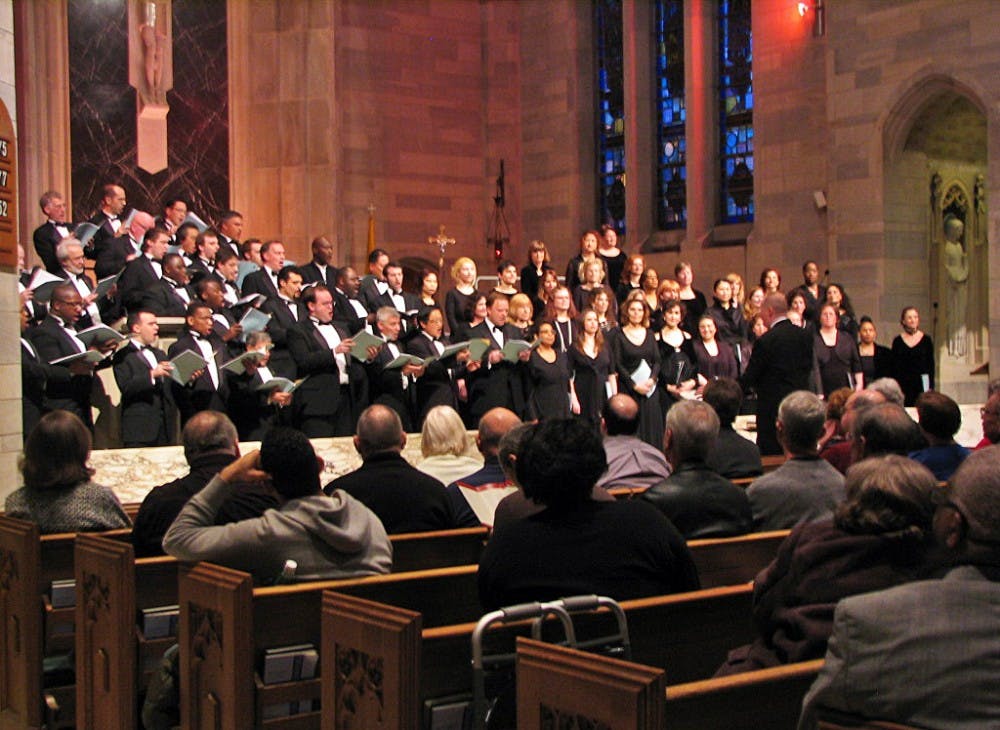It may have been a cloudy Sunday afternoon, but inside St. Ann’s Catholic Church in Tenleytown, music patrons and performers came together to brighten the lives of artists in need.
The Washington National Opera Chorus performed a variety of works to raise money for the American Guild of Musical Artists Relief Fund, a service that offers financial assistance to any member in good standing and in need of help.
“Many artists in the area are suffering as performance schedules are cut or entirely eliminated ... To address this current crisis and help our friends in need, we took action and organized the AGMA Relief Benefit Concert,” Maestro Steven Gathman, chorus master of the Washington National Opera, said in a press release.
Though the AGMA Relief Benefit Concert had no admission charge, attendees were encouraged to donate money at the door.
In an interview with The Eagle before the performance, WNO chorus member and AU voice teacher Jeffrey Tarr said he hoped that the concert would not just raise money, but also be able to show the amount of community support for the arts.
“My greatest hope is for the entire auditorium of the church to be filled with people, whether or not they’re able to financially give very much at all, but just to show support of this art,” Tarr said. “Just to see the support of the community saying, ‘Yes, we desire good music; we desire to support WNO Chorus and Washington Opera by attending this concert and enjoying this wonderful music’ ... And maybe convert a few people into loving opera in the meantime.”
If the audience in the church represented community support, then the showing was encouraging. Among the faces in the crowd were a decent amount of young adults and children, a new generation of potential patrons.
The first half of the program featured haunting Latin pieces and standard spirituals. The spirituals performed, including an upbeat Moses Hogan rendition of “Ezekiel Saw de Wheel,” had a warm, accessible feeling. Norman Luboff’s arrangement of “Deep River” featured a beautiful solo by bassist Harvey Fort.
The second half of the program featured crowd-pleasing opera numbers. The Chorus sounded the most in their element in this half, but especially on “Humming Chorus” from Puccini’s “Madame Butterfly.”
Tenor Timothy Augustin dazzled the crowd with his performance of “Ah! Mes Amis!” from Donizetti’s “La Fille du Regiment.” The aria required the singer to hit nine high C’s, an extremely difficult task for any tenor. (Juan Diego Flórez famously performed the aria at La Scala in Milan so well that the audience applause demanded a solo encore — the first since 1933. He repeated this distinction at the Metropolitan Opera.) Augustin sang each note with relative ease, pleasing the audience as seen by their thunderous applause and cheers of “Bravo!”
AGMA Mid-Atlantic representative Eleni Kallas thanked the audience for attending and urged them to give to the relief fund.
“No donation is too small. On the other hand, no donation is too large,” Kallas said.
AGMA is a labor union run entirely by elected members. It’s similar to the Screen Actors Guild, except that members are allowed to take non-union jobs. Much like other unions, AGMA negotiates contracts with employers, ensures members receive a fair amount of money and protects their interests.
Tarr, who received his master’s degree in music at the Peabody Conservatory, is a member of AGMA. He joined in 1999 as a requirement to perform with the Baltimore Opera Chorus. At the time, he didn’t fully understand the purpose of a union, but is now very thankful to be a part of it.
“The union really protects the artists’ interests,” Tarr said. “It protects us professionally and our personal safety.”
The Baltimore Opera Company’s bankruptcy and subsequent closing has had a prominent effect on D.C.-area musicians, Tarr said. The company closed mid-season, leaving many professional musicians without work for the next few months.
“If you don’t get those contracts before fall, you won’t get them mid-season,” he said. “So these people were out of work and had to find other jobs to support themselves during that time and not really use their professional skills.”
During a recession, the arts — a luxury — are the first things to be cut from people’s budgets, Tarr added. He said that there are three ways for opera companies to sustain: appeal to the audience, create new audience members and keep our old ones.
“I think that this is a time when the government should really support the arts,” Tarr said. “I know that we can’t be like Germany, the opera companies are almost 50 percent funded by the government, but any government assistance to continue the arts while the economic downturn persists would be most helpful.”
Until more help arrives, AGMA members will be looking out for one another as well. So will the community that appreciates what they create.
Information about donating to the AGMA Relief Fund can be found at www.musicalartists.org.
You can reach this writer at thescene@theeagleonline.com.





